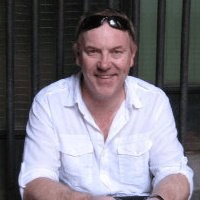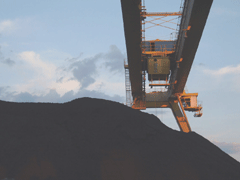The Changing Climate of the EU's Climate Change Commitments
Air Date: Week of October 17, 2008

Could the financial crisis chill the EU’s warm feelings about fighting climate change?
A year after Europe took the lead in the international fight against global warming, some European Union member countries are having second thoughts about their commitments to reduce greenhouse gas emissions. Matt McGrath of the BBC World Service tells Living on Earth host Steve Curwood about the divisions in the EU, and what they'll mean for the next round of Kyoto Protocol negotiations.
Transcript
[THEME]
CURWOOD: From the Jennifer and Ted Stanley studios in Somerville, Massachusetts, This is Living on Earth. I’m Steve Curwood.
In 2007 the European Union put its 27 member states on the front lines of the global warming battle by promising big cuts in greenhouse gas emissions. But a lot can happen in a year. Reductions have not been so easy for Italy, Spain and Eastern Europe, and with a global financial crisis to nurse, there are added fears that compliance will come at too high a price.
Joining me now from London is Matt McGrath. He's environmental correspondent with the BBC World Service who has been following the current round of the European climate negotiations. Thanks for joining me, Matt.
MCGRATH: Hi Steve, how are you?
CURWOOD: Now Matt, the European Union was supposed to lead the world in the fight against global warming, but now what – a year after pledging to decrease greenhouse gas emissions, the EU doesn’t seem so enthusiastic now about getting there. What’s going on?
MCGRATH: Yeah, there’s a chill wind blowing through the corridors of Europe at the moment and all that great unity of the 27 members seems to be going out the window a little bit. You remember just a year ago, they were talking about cuts of 20 percent of emissions by 2020, 20 percent improvement in energy efficiency by 2020 and 20 percent commitment to using renewables by 2020. All the twenties, as they call them. But now, after everything that’s happened with the economy and as the realization of how much this actually means in real terms is dawning on the leaders of the EU, there are some very, very cold feet, particularly in Eastern Europe, but not just there, in Germany as well and Italy – all over we’re seeing an outbreak of “well, we need to be a little bit more flexible about this.”

Matt McGrath, environmental correspondent for the BBC World Service.
MCGRATH: That is a good argument in some respects and there’s also another argument that in the current climate that we’re in, emission cuts will be more easily achieved because people will be using less oil, coal. But I think there’s just a general fear that the cost of the implementations, particularly in some countries, will make jobs disappear and at this particularly crucial time when we’re talking about spending billions of dollars around the world to save the banks, when people are fearing for their jobs as well, to be putting up the costs of making cars in Germany or whatever it might be and helping export those jobs to other parts of the world – that is a real political no-no, that’s something that no politician will want to do. So Angela Merkel, the German Chancellor, the most committed European in terms of driving these targets, is now starting to talk about backing off to protect the native industry that are very important to Germany, the big, heavy coal and steel industries, car manufacturing. Those are the jobs, and those jobs are held by people who vote, and they vote in German elections, and that’s the political reality meeting the “ideal,” if you like, in terms of the climate.
CURWOOD: Now tell me a bit about Poland in this situation. I understand that they’re leading this coalition to block the EU climate change package unless it’s modified. What are the Poles worried about and what do they want?
MCGRATH: The Poles have had a big problem because they generate 96 percent of their electricity from coal. They are a very coal dependent country. The alternative for them is to get gas from the Soviet – from Russia, which was part of the Soviet Union. They would have to become dependent back on Russia again, something that politically is a nonstarter in Poland.

Zeran power plant in Warsaw. More than 90 percent of Poland’s electricity comes from coal. (Photo: Ludmila Krzewska)
CURWOOD: Ironically, Poland is the site of the next International Summit on Climate Change Negotiations in December. How might these tensions in the European community spill over into those negotiations?
MCGRATH: It’s a very interesting question because not only do you have the negotiations this December in Poznań, in Poland, but you’ve got the final round, the end of it all, the end of the [inaudible] show taking place in Copenhagen, also in Europe twelve months on. So in this time period where the European Union was hoping to present itself as the world leader, now you’ve got these first set of negotiations in the country with whom the European Union is at odds with how it actually conducts its policy. So it’s likely to take some of the wind from the sails of the European Union, and actually help it to backtrack a little bit. And I think there’s a feeling amongst other countries in the world that while the Europeans have been great at talking, when it comes to the negotiations they haven’t been as good as their word up to now.
CURWOOD: Both U.S. presidential candidates, major candidates, have come out in favor of mandatory limits on greenhouse gases. How possible is it that the United States takes the reins from Europe on climate change and leads the world towards the post Kyoto future?
MCGRATH: Well I suppose anyone who was in Bali last December and saw what happened to the U.S. delegation when the entire world turned on it and said “Look guys, we want to move ahead here and you guys are the roadblock” I think anybody who saw that would be surprised if there was a massive change, even with a McCain or an Obama administration. But I think there is a need, a desire, a belief that the United States could actually go from bad guy to world leader on this with a few judicious statements and a few judicious laws to go along with it. There will be a lot of positivity for a new president coming in – I suppose a honeymoon period, if you like – but when it gets down to closing the doors, will people give the new president the benefit of the doubt in terms of climate? It’s hard to know as yet, it’s very hard to know how that will pan out as yet.
CURWOOD: Matt McGrath is environmental correspondent for the BBC. Thanks Matt.
MCGRATH: My pleasure.
Links
Living on Earth wants to hear from you!
Living on Earth
62 Calef Highway, Suite 212
Lee, NH 03861
Telephone: 617-287-4121
E-mail: comments@loe.org
Newsletter [Click here]
Donate to Living on Earth!
Living on Earth is an independent media program and relies entirely on contributions from listeners and institutions supporting public service. Please donate now to preserve an independent environmental voice.
NewsletterLiving on Earth offers a weekly delivery of the show's rundown to your mailbox. Sign up for our newsletter today!
 Sailors For The Sea: Be the change you want to sea.
Sailors For The Sea: Be the change you want to sea.
 The Grantham Foundation for the Protection of the Environment: Committed to protecting and improving the health of the global environment.
The Grantham Foundation for the Protection of the Environment: Committed to protecting and improving the health of the global environment.
 Contribute to Living on Earth and receive, as our gift to you, an archival print of one of Mark Seth Lender's extraordinary wildlife photographs. Follow the link to see Mark's current collection of photographs.
Contribute to Living on Earth and receive, as our gift to you, an archival print of one of Mark Seth Lender's extraordinary wildlife photographs. Follow the link to see Mark's current collection of photographs.
 Buy a signed copy of Mark Seth Lender's book Smeagull the Seagull & support Living on Earth
Buy a signed copy of Mark Seth Lender's book Smeagull the Seagull & support Living on Earth

